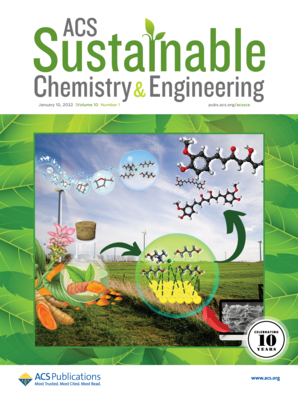Multidimensional Utilization of Kraft Lignin: Upgrading Glycerol to Sustainable Fuel Additives Using Lignin-Derived Benzaldehyde over Lignin-Based Acid Catalyst
IF 7.1
1区 化学
Q1 CHEMISTRY, MULTIDISCIPLINARY
引用次数: 0
Abstract
This study aims to explore a lignin-based catalyst for the green synthesis of sustainable fuel additive using lignin-derived benzaldehyde and glycerol, byproducts from the paper industry and biodiesel preparation, respectively. This sustainable fuel additive can be refilled into biodiesel to improve the carbon atom economy, promoting resource efficiency and environmental sustainability. Kraft lignin was modified with phosphoric acid and sulfuric acid to prepare solid acid catalysts KL-HP-SO3H. A series of characterization techniques showed that phosphorylation can markedly enhance the specific surface area, while sulfonation can notably increase the acid sites and acid strength. The synergistic physical–chemical effect of phosphorylation and sulfonation collectively enhances the activity of the KL-HP-SO3H catalyst. In addition, ball milling and thermal catalysis were compared and analyzed in this study. The results show that the ball milling technology offers an advantage: it achieves a high product yield within only 15 min. The ball milling process consumes less energy than the hydrothermal reactor (21.3 vs 493.8 kWh·mol–1). From a long-term investment perspective, the ball milling process is economically superior. This study contributes an efficient catalyst strategy to green chemical synthesis while providing multifunctional utilization of lignin.

求助全文
约1分钟内获得全文
求助全文
来源期刊

ACS Sustainable Chemistry & Engineering
CHEMISTRY, MULTIDISCIPLINARY-ENGINEERING, CHEMICAL
CiteScore
13.80
自引率
4.80%
发文量
1470
审稿时长
1.7 months
期刊介绍:
ACS Sustainable Chemistry & Engineering is a prestigious weekly peer-reviewed scientific journal published by the American Chemical Society. Dedicated to advancing the principles of green chemistry and green engineering, it covers a wide array of research topics including green chemistry, green engineering, biomass, alternative energy, and life cycle assessment.
The journal welcomes submissions in various formats, including Letters, Articles, Features, and Perspectives (Reviews), that address the challenges of sustainability in the chemical enterprise and contribute to the advancement of sustainable practices. Join us in shaping the future of sustainable chemistry and engineering.
 求助内容:
求助内容: 应助结果提醒方式:
应助结果提醒方式:


